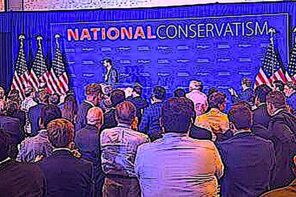On the one hand, this story from Charisma News is completely silly:
Following a very heated primary, it’s not entirely uncommon for the vanquished’s supporters to threaten the political equivalent of taking the ball and going home.
But are Bernie Sanders supporters seriously considering secession? In a recent commentary written for “The Conversation,” William Irwin, a philosophy professor who chairs the philosophy department at King’s College in Pennsylvania, describes just how that might work
The rest is more or less Prof. Irwin speculating on how Sanders followers could maybe possibly if you kind of squint at it in the right light pull Vermont out of the union. I’ll believe it when Bernie gives up basketball, or when Trump stops wearing whatever the hell that is on top of his head. It’s not going to happen.
Obviously, Charisma is just throwing this out there as a topic of conversation. It’s summer, everybody needs the clicks. But I confess to secretly hoping it would have some sort of religion angle. Hell, I’d settle for quasi-religious. Maybe Berniecrats are joining the subterranean movement to break up the United States, or at least scramble its map? (In fact, Sanders did well in many of the same places where secessionist fever runs high, including some hard-right Christian areas.)
Could Sanders supporters organize a liberal alternative to Rod Dreher’s Benedict Option? That seems more like it:
As Thomas H. Naylor, the originator of the Second Vermont Republic, says, “Vermont provides a kinder, gentler, more communitarian alternative to a nation obsessed with money, power, size, speed, greed and fear of terrorism.”
This is just warmed-over hippiespeak, of course. But then it was the hippies who moved “back to the land” and settled in communes, providing the most recent model for how the Benedict option might actually work in the U.S., albeit a very secular one. That would have been worth exploring, even if it was just to have Charisma sneer about the lack of Christian values. And there are religious models for sort of thing, actually: Orthodox Jews dominating a local school system, for example, or Islamberg, New York, a hamlet founded in the Catskill mountains by Muslim migrants. True, they’re not really secessionist: the first is more a takeover of existing institutions, and the second is founding those institutions for yourself. Still, if you want to go the separatist route, there are some clues as to how it could be done.
Or maybe the Sanders folks might go the secession-in-place some conservative Christians have tried, isolating themselves from the more corrupt and inequitable forms of American society?
There’s something to that, actually. No, the “cult of personality” jokes you hear aside, I don’t expect the Sanders movement to “weaponize religious liberty” any time soon. But thinking about secession in terms of old-style fundamentalists or Pentecostals—the kinds of Christians who preferred not to participate in politics at all—does point to what might actually happen. Sanders has brought in many first-time voters, and many of his supporters like to say that given a choice between America’s Problem Child and Hillary Clinton, they’d rather stay home. There’s some puffery to that, but it’s certainly possible that more than a few of the people loosely attached to politics that Sanders attracted might float back out of engagement, concluding that the system offers them no real alternative. To make a bad analogy, the Democrats’ work this fall will be convincing the first-time church visitors to come back next Sunday.
Likewise, I wouldn’t expect Bernie’s people to be as openly hostile to other views as some of the more revanchist Christians are. Nor would I think they’d invade Vermont and formally secede from the Union. No, if they’re interested in anything, it’s the kind of self-sorting that’s been going on in American society for quite a while now. Which is to say, they’ll “secede” by continuing to move to places like Portland or Ann Arbor or Minneapolis or any of the other big metro areas, while conservatives cluster in the suburbs and rural areas. It’s less secession than fragmentation, in other words. I hope things don’t shake out this way. Actual secession might do less damage in the long run.





